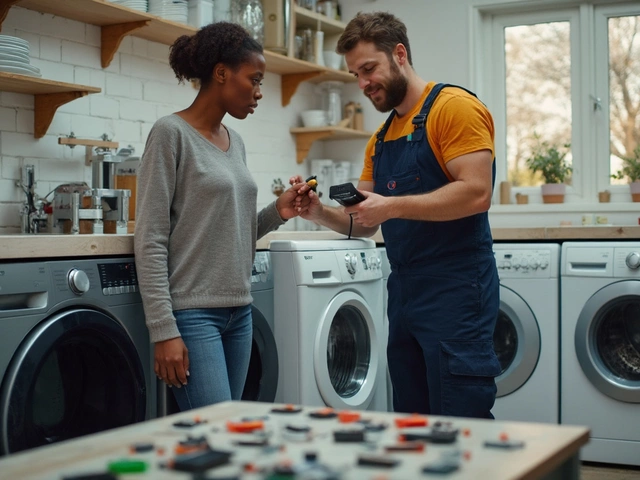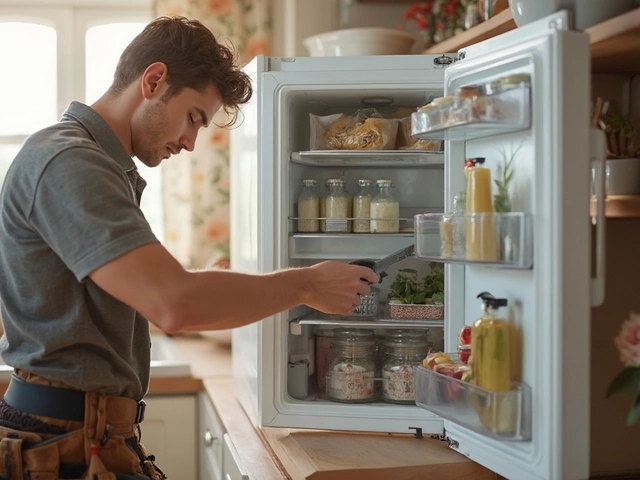When your washing machine stops spinning, the oven won’t heat, or the heat pump stops blowing warm air, it’s easy to feel stuck. The good news? Most everyday malfunctions have simple checks you can do before dialing a technician. Below are quick steps to spot the issue, fix the easy stuff, and decide when it’s time to call in the experts.
Start with the obvious. Is the appliance plugged in? Is the switch on? A loose plug or a tripped breaker is the most common cause of a non‑working unit. Next, listen for any unusual noises – a humming fridge or a clicking boiler can point to a specific fault.
For ovens, the first thing to test is the heating element. If the light works but the oven stays cold, the element may be burnt out. For water heaters, a reset button that keeps tripping often means a thermostat problem or sediment build‑up. Heat pumps that blow cold air usually have a clogged filter or a low‑temperature sensor issue.
Once you know the symptom, try these low‑cost fixes. Cleaning is a powerful tool – clear dust from heat pump filters, remove lint from dryer vents, and wipe condenser coils on fridges. A blocked filter can make a heat pump think the room is colder than it is, so it won’t heat properly.
If an oven isn’t heating, unplug it, locate the element (usually under the oven cavity), and look for a broken spot or a dark line. Swapping the element with a new one is a straightforward job that takes under an hour with basic tools.
For a dishwasher that keeps resetting, check the water inlet valve for debris and make sure the door latch clicks into place. A misaligned latch tricks the machine into thinking the door is open, causing a reset.
When a washing machine shows signs of aging – loud banging, water not draining, or spin cycles failing – clean the pump filter and check the drive belt for wear. Replacing a worn belt is cheap and can restore smooth spinning.
Remember safety: always disconnect power before opening any appliance. If you’re dealing with gas‑powered boilers or water heaters, stop after the basic checks and call a Gas Safe engineer. Gas leaks are not worth the risk.
Finally, keep a maintenance log. Note the date of each fix, what you did, and any parts replaced. This record helps you spot patterns – for example, if the fridge’s compressor fails repeatedly, it may be time for a new unit rather than endless repairs.
By following these steps you can handle most common malfunctions without a big bill. When the problem persists, a qualified technician will have a clear picture of what’s been tried, speeding up the repair and saving you even more time.

Learn how to spot a malfunctioning heat pump, recognize warning signs early, and troubleshoot issues to keep your home comfortable and energy bills in check.

Curious which washing machine brand stands up best to repairs and everyday wear? This article digs into brand reliability, repair costs, and little-known tips every washing machine owner should know before buying or fixing one. You'll get the real scoop on which brands are easiest to fix, which have the cheapest parts, and what actually ends up causing most breakdowns. Whether you've had bad luck with machines before or just want a smooth laundry routine, this guide breaks it all down. No bias, just straight talk based on what actually happens when these things break.

Discover if electric hobs can be fixed, cost breakdowns, DIY steps, safety tips, and when to replace. A practical guide for UK homeowners.

Extractor fans are essential for maintaining good air quality, especially in kitchens and bathrooms. When they stop working, it might be due to electrical, mechanical, or cleanliness issues. Understanding the root causes of fan failures can save you time and money in repairs. Discover common problems, practical tips, and preventive measures to keep your fan spinning efficiently.

Resetting a freezer compressor may sound daunting, but it's an essential skill for maintaining your appliance's efficiency. Compressors can occasionally need a reset to function properly, potentially saving you from costly repairs or replacements. This article walks you through the steps to safely reset your freezer compressor and offers tips to prevent future issues. Understanding when and why to reset your compressor can keep your freezer running smoothly and extend its lifespan.

Curious if you can fix your dishwasher without calling a pro? This article breaks down the most common dishwasher problems and explains which repairs you can actually do yourself. We’ll cover how complicated these appliances really are, how to figure out what’s wrong, the tools you’ll need, and which jobs might leave you better off calling an expert. Get practical tips, interesting facts, and a clear picture of what you’re actually signing up for before grabbing that toolbox.